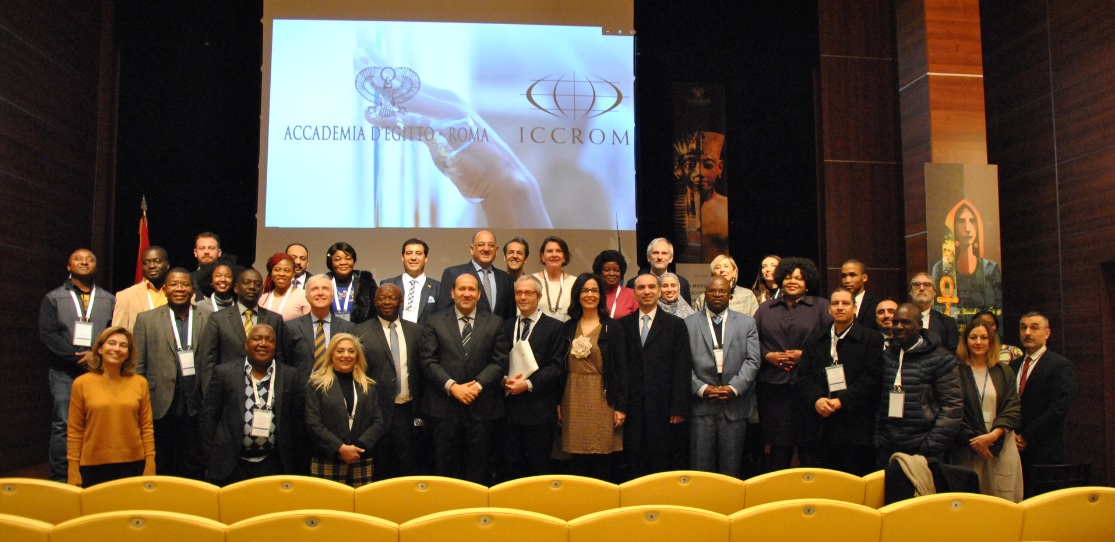New Africa programme to focus on youth and its engagement with heritage
Connect and inspire African youth with the possibilities of their rich heritage. Use digital technologies, including social media, to promote heritage awareness and support creative industries. Engage heritage as an economic asset, to address poverty and unemployment among young people. These are just some of the potential directions discussed during ICCROM’s Africa Expert Meeting for Cultural Heritage Conservation, held at the Egyptian Academy in Rome from 9 – 11 January 2019.
Fifteen professionals from 15 institutions met to discuss how best to design an impactful programme to support youth and its engagement in heritage in the African region. The Africa Expert Meeting took inspiration from the United Nation’s 2030 Agenda for Sustainable Development, and particularly from the development goals for sustainable cities and communities, gender equality, decent work and economic growth. Also invoked was the Africa Union’s Agenda 2063 “The Africa We Want,” which is committed to realizing Africa’s full potential in development, culture and peace.
The event was launched on Wednesday 9 January in the presence of HE Mr Hisham Badr, Egyptian Ambassador to Italy, HE Mr Hassan Abouyoub, Moroccan Ambassador to Italy, Mr Giovanni Panebianco, Secretary-General of the Italian Ministry of Cultural Heritage and Activities (MIBAC), and Dr Gihane Zaki, Director of the Egyptian Academy in Rome, together with Dr Webber Ndoro, Director-General of ICCROM.
“Africa has the youngest population of any continent,” said Dr Ndoro, ICCROM’s Director-General. “Heritage can be for youth a source of livelihood, identity, and a stimulus for development. The input of youth needs to be clear for what our heritage is and how to take it forward.”
Noting Egypt’s upcoming presidency of the African Union in 2019, Egyptian Ambassador Hisham Badr commented: “This meeting focuses on two important elements: culture – with all its meanings, values, messages – and youth.” He added, “Culture is a mainstay. Egypt is a nation that’s proud of its culture. In all its international relationships, in its sustainability initiatives, culture is the key.”
“We must consider the needs and special skills of youth,” underlined Giovanni Panebianco, Secretary-General of the Italian Cultural Heritage Ministry MIBAC. “Heritage conservation offers real opportunities to build a better future for Africa. Italy is aware of its role with respect to Africa, and is actively pursuing scientific and cultural cooperation in the aim of overall sustainable development on the continent.”
“It’s time to invest in young Africans,” said Dr Gihane Zaki, Director of the Egyptian Academy in Rome. “How can we put young people forward, help them take responsibility for their heritage, with enthusiasm, energy, generosity and passion?” Dr Zaki stressed Egypt’s keenness to support young people in the African continent. “I am confident that ICCROM will play a strategic role in implementing new, fresh and innovative ideas to engage young people. It’s important also to remember and appreciate women’s pivotal role in African societies.”
The three-day discussions led to definition of broad directions for a future Africa programme that aims to make African heritage attractive to young people on the continent, improving their involvement in the stewardship of heritage to ensure inclusive economic and social benefits to all generations. The proposed Africa programme includes the following objectives:
1) Sustain economic and social development through innovation and engagement with stakeholders for youth and women in heritage.
2) Increase engagement and interest of youth and women in heritage through the adoption of a people-centred approach in conservation.
3) Strengthen institutions as dynamic, innovative, reliable and attractive resources for communities, government and the private sector.
These objectives were presented at the event’s closing ceremony on Friday 11 January, attended Mr Giorgio Marrapodi, Director-General of Italian Ministry of Foreign Affairs and International Cooperation (MAECI), and Mr Cléophas Adrien Dioma, Director and co-founder of the Ottobre Africano festival and representative of the African Diaspora in Rome.
“This programme is about making heritage cool through innovative ways, and making African heritage accessible to African youth and women,” said Benis Nchang of Better Life Initiative, Cameroon and Alyssa K Barry of Senegal, youth representatives to the meeting. “It’s about making youth proud of our African cultural heritage, and encouraging them to contribute to its conservation.”
For his part, Dr Ndoro thanked all the meeting participants for their contributions to the discussion, as well as the ambassadors and institutional representatives present. He extended particular thanks to the Egyptian Academy in Rome for hosting the event, and called on all ICCROM’s partner institutions and Member States, both in Africa and worldwide, to support this new initiative.
“It’s time to unlock the potential of heritage to provide a better life and livelihood to communities in Africa,” said Dr Ndoro. “Heritage is about now, about what is happening today. Youth must see the opportunities in heritage.”
Member States represented: Benin, Botswana, Cameroon, Canada, Côte d’Ivoire, Egypt, Ethiopia, France, Morocco, Nigeria, Saudi Arabia, South Africa, Sudan, Swaziland, Tanzania, and Zimbabwe.
The Africa Expert Meeting was held at the Egyptian Academy in Rome, by gracious invitation of its Director, Dr Gihane Zaki, also an ICCROM Council Member. The Egyptian Academy is the only fine arts academy in Rome that represents both Africa and the Arab States, and thus is a committed stakeholder in a successful Africa strategy at ICCROM.
About ICCROM
ICCROM is an intergovernmental organization dedicated to the preservation and promotion of cultural heritage worldwide. It works with 136 Member States to ensure the best tools, knowledge, skills and enabling environment to preserve cultural heritage in all its forms, for the benefit of all people. www.iccrom.org





